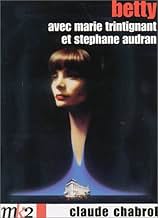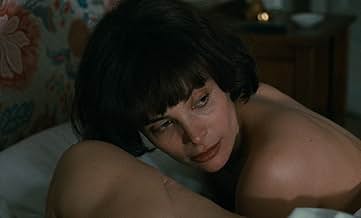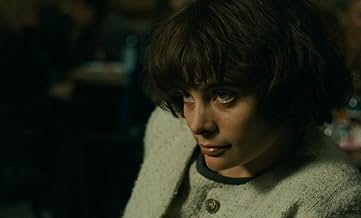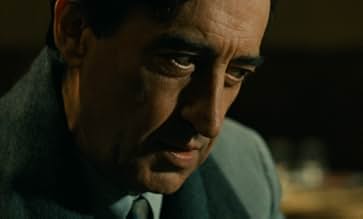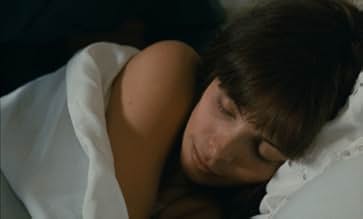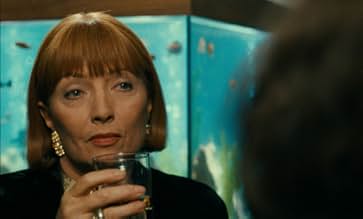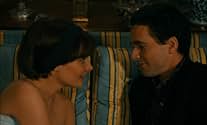Aggiungi una trama nella tua linguaA drunken self-destructive woman called Betty wanders through bars and meets a man that drives her to a restaurant outside Paris called Le Trou (The Hole). She meets the middle-aged alcoholi... Leggi tuttoA drunken self-destructive woman called Betty wanders through bars and meets a man that drives her to a restaurant outside Paris called Le Trou (The Hole). She meets the middle-aged alcoholic Laure from Lyon, who is the lover of the Le Trou's owner Mario. Laure decides to take ca... Leggi tuttoA drunken self-destructive woman called Betty wanders through bars and meets a man that drives her to a restaurant outside Paris called Le Trou (The Hole). She meets the middle-aged alcoholic Laure from Lyon, who is the lover of the Le Trou's owner Mario. Laure decides to take care of Betty and brings her to the room next-door in her hotel. Along the days, Betty tells... Leggi tutto
- Regia
- Sceneggiatura
- Star
- Premi
- 1 vittoria in totale
Recensioni in evidenza
Cinematography is part of the story. Like at Berri's "Tchao pantin" (1983), Bernard Zitzermann's work enhances the story at the right time, and then releases its grip on us. When it pours rain and Betty is carried like merchandise from one tramp to another, you feel wet and desolate. The song "Je voulais te dire que je t'attends" is very effective too, I felt bad just by comparing the moving lyrics with what we were seeing, the road to nowhere.
Simenon is a love/ hate affair, I find it hard to be objective with him. I can't speak about his novels, but I can't say I like watching his cinema adaptations, they make me feel bad about everything in life after having watched them. And yet, I though they well made, atmospheric, immersing, in a sort of "descent to hell" way. I mean, it's like reading Dostoievsky but less melodramatic, and with way more sex & the facade of love as subjects.
This is a film about women. Marie Trintignat of course IS this movie. Frail, elegant, beautiful, but enigmatic, always following her own ways, in her private world where no one reaches her, it's hard to love her if one sees her objectively, but is nevertheless an alluring character. Reading her bio on IMDb is heavily interesting, it's like Claude C understood her personality, almost her "destiny", encapsulated it and gave it to us on celluloid, thus, making it last sort of forever.
Laure, on the contrary, while no angel, maybe sees in Betty some sort of projection of herself, some "lost soul to be saved", or in any case, she mothers Betty, in a non dominating way, firm when she has to, almost too perfect to be real.
Mario and Guy Etamble are characters devoid of soul, will or personality. Guy of course is dominated by the family, even when they made her sign the legal contract, it's "them", not him. Even the sister in law is there :)! So when they have to decide "what to do with her", it's a family affair, in which Guy is only one of the voices. And of course there Madame Etamble seems to be the only dominating force. Again, women are the only source of plot in this story.
A very "French" film in the use of a convoluted plot, frequent flashbacks, "originary scenes" all the time (torrid sex scenes unintended to be seen, but of course finally obvious, unless you think there is always a motif for everything, so ... :)). Psychoanalysis is a commanding force, "manifestly" in the mouth of one of Betty's lovers, the intellectual, spectacled Freud follower, but "latently" in all of this oeuvre.
dbdumonteil's review has probably the best quote on this film, by Marie T., you better read it from his review proper.
Chabrol loves to hate the bourgeoisie, so it's no news they look silly and dumb here. The "bourgeois wealth, rigid roles, invisible servants, funless family in short". Chabrol would probably put the blame of most on them, but we don't have to. Nothing new by now, no big deal, Claude :).
This is a cautionary tale in many ways, but of course you'll have to watch this movie to find out why.
PS: The storyline review by "jhailey@hotmail.com" has spoilers, can't anybody do something about it?
Actually, the source novel for it was the handiwork of celebrated pulp writer Georges Simenon and Chabrol's film version is buoyed by a spunky central performance from the ill-fated Marie Trintagnant (the daughter of actor Jean-Louis and director Nadine, she died in 2003 aged 41 from a cerebral haemorrhage, following a beating-up by her live-in boyfriend!) and a quietly mature one by Chabrol's former wife and frequent muse Stephane Audran.
The title character is a woman who, marrying above her station, is subsequently thrown out of her house after she gives in to her baser instincts; as a result, she takes to an aimless existence on the streets, drinking and chain-smoking her nights away in the company of strangers. Thankfully, she is picked up from the gutter by an enigmatic middle-aged woman (with a much younger companion) who installs her into her own lavish apartment and gradually helps her pick up the pieces of her broken-down life. But the innately sensuous qualities of the waif-like Betty soon catch the attention of her benefactor's boyfriend and, perhaps inevitably, tragic circumstances ensue.
The low-key qualities of BETTY are countered by Chabrol's decision to structure his film as a complex maze of flashbacks which depict (and contrast) the stuffy, ordered, aristocratic lifestyle the protagonist suffered through in her married past, versus her new, chaotic but free-spirited present state. All in all, therefore, the film can be counted as yet another feather in Chabrol's prolific and largely consistent cap.
The story begins with Betty on a date with a psychotic ex-doctor and she's becoming drunk VERY fast (I can't recall EVER seeing a character in a movie drink that many drinks so fast). When she awakens she's in the home of an older woman who has rescued her. And, slowly in flashbacks, we see Betty's story about her life--given in bits and pieces interspersed throughout the film. There were two problems with this method: first, it was, at times, pretty confusing following the action, and second, I just found myself not particularly caring about the character. She was a total mess.
It's a shame, as I have really enjoyed several other Claude Chabrol movies--this, unfortunately, isn't one of them. It only scores a 4 because the acting is good--the story sure isn't.
Lo sapevi?
- QuizThe last film that director Claude Chabrol and his former spouse Stéphane Audran made together.
- ConnessioniFeatured in Antenne 2 - Le journal de 20H: Episodio datato 16 febbraio 1992 (1992)
- Colonne sonoreJe voulais te dire que je t'attends
Written by Michel Jonasz and Pierre Grosz
Performed by Michel Jonasz
I più visti
- How long is Betty?Powered by Alexa
Dettagli
Botteghino
- Lordo Stati Uniti e Canada
- 58.099 USD
- Fine settimana di apertura Stati Uniti e Canada
- 5243 USD
- 22 ago 1993
- Lordo in tutto il mondo
- 58.099 USD
- Tempo di esecuzione1 ora 43 minuti
- Mix di suoni
- Proporzioni
- 1.66 : 1
Contribuisci a questa pagina


